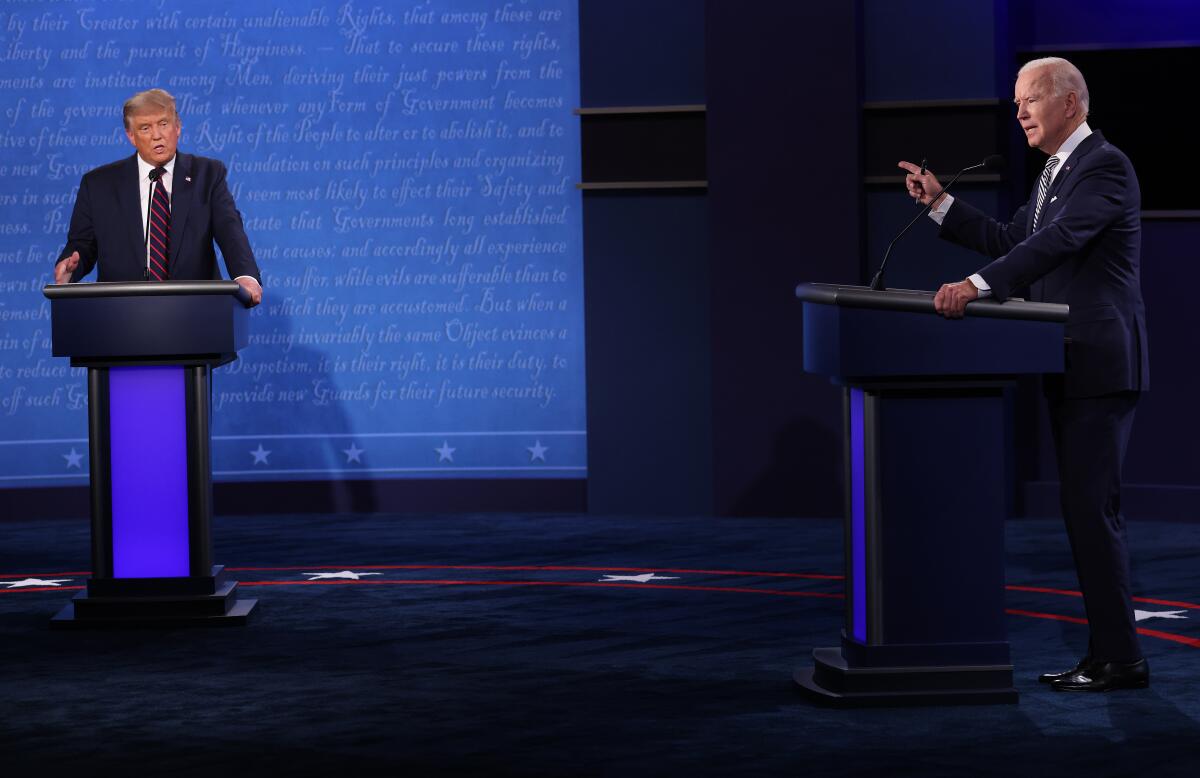Polls 2020: Despite surprise news, a stable race with Trump behind in key states

- Share via
WASHINGTON — The last few weeks have heaped surprise after surprise onto an already-contentious race for the White House: Justice Ruth Bader Ginsburg’s death, the confirmation battle over her replacement, reports that President Trump paid only $750 in federal income taxes, a raucous and controversial first debate, Trump’s hospitalization from COVID-19.
We might expect such dramatic headlines to alter the direction of the race. Trump, who has been trailing, surely hoped to get a boost from the debate, for example.
That hasn’t happened. The debate — near-universally criticized for its structure, which the debate commission plans to change, and its content — does not appear to have helped Trump at all. Some polls suggest it may have cost him support.
A new post-debate Wall Street Journal/NBC News poll, for instance, gives Biden a 14-point national lead — a significant bump to the 8-point advantage the same pollsters gave him in mid-September.
“The survey finds something rare in Journal/NBC News polling: evidence that an individual news event — the debate — is having a material effect on Mr. Trump’s political standing, at least for now,” remarked the Journal’s Aaron Zitner.
A handful of new state-level polls, taken primarily in the period between the debate and the announcement that Trump had the coronavirus, showed less of a shift. That’s not particularly good news for Trump, either, because he’s behind and needs to catch up in many of those battlegrounds.
Stability is certainly the takeaway from two new surveys of Pennsylvania voters, both conducted from Sept. 30 to Oct. 2.
One, from the New York Times and Siena College, found Biden leading Trump 49% to 42%. That’s more or less unchanged from Siena’s pre-debate Pennsylvania poll, which found a 49%-40% Biden lead.
The other survey, from CBS News and YouGov, indicates a comparable gap, showing Biden ahead 51% to 44%. That, too, is almost indistinguishable from a survey the same pollsters conducted two months ago, which showed a 49% Biden-43% Trump split.
Ohio, another battleground state, appears similarly stable. A CBS News/YouGov poll, again taken between Sept. 30 and Oct. 2, found the candidates tied there at 47% each. Trump won Ohio by about 8 points in 2016, so for the state to be tied now is an indication of the problems his campaign faces.
The CBS News/YouGov poll is similar to pre-debate findings from Quinnipiac University (Biden 48%, Trump 47%) and, to a lesser degree, Fox News (50% Biden, 45% Trump, with a 3-point margin of error).
Ohio has swung between Democrats and Republicans in the last few presidential election years. By contrast, Pennsylvania had been consistently blue from the 1990s until Trump won it by a narrow margin in 2016. Those two, and other major industrial states such as Michigan and Wisconsin, have seen some of the election’s fiercest campaigning.
Another state seemingly unchanged by the debate appears to be Arizona. A post-debate New York Times/Siena poll released Monday found Biden beating Trump 49% to 41%.
The same pollsters found Biden ahead 49% to 40% in a survey conducted Sept. 10-15.
Suffolk University polling suggested a tighter race in the state: Biden 50% and Trump 46% in a survey conducted primarily, but not exclusively, before the debate.
New Hampshire also shows little change. Emerson College reported a Biden lead of 52% to 45% in a poll conducted from Sept. 30 to Oct. 1 (that is, after the debate but before Trump’s COVID-19 announcement). That’s roughly consistent with pre-debate surveys.
In the lead-up to the debate, analysts pointed to the event as one of Trump’s last opportunities to turn around a race in which he’s consistently been trailing.
Instead, whether one looks at the Wall Street Journal/NBC News survey, in which Biden’s lead seems to have grown, or the individual state surveys, in which the race has been stable, Trump continues to trail.
Pollsters won’t have long to ponder the debate impact because of the race’s next disruption: Trump’s COVID-19 diagnosis.
We won’t be able to fully gauge that for a few more days, but so far, one thing seems true: There’s no sign of a widespread sympathy vote for Trump. In a potential augur of things to come, surveys conducted by Morning Consult from Oct. 2-4 found a 9-point Biden lead — “his largest margin since late August,” the polling firm said.
And a newly released CNN poll found that nearly two-thirds of voters, 63%, said Trump had been “irresponsible” in his handling of the risk of infection to people around him. Only 33% said he had acted responsibly.
The state-level impact of the president’s sickness, if one emerges at all, should start showing up in polls throughout this week.
Our previous reports on campaign-trail polling
Sep. 28 — As Biden, Trump begin debates, the races in battleground states are tight
Sep. 24 — Biden strong in red states; Collins struggling at home
July 23 — Biden leads in the polls: Could they be missing something?
More to Read
Get the L.A. Times Politics newsletter
Deeply reported insights into legislation, politics and policy from Sacramento, Washington and beyond. In your inbox twice per week.
You may occasionally receive promotional content from the Los Angeles Times.










